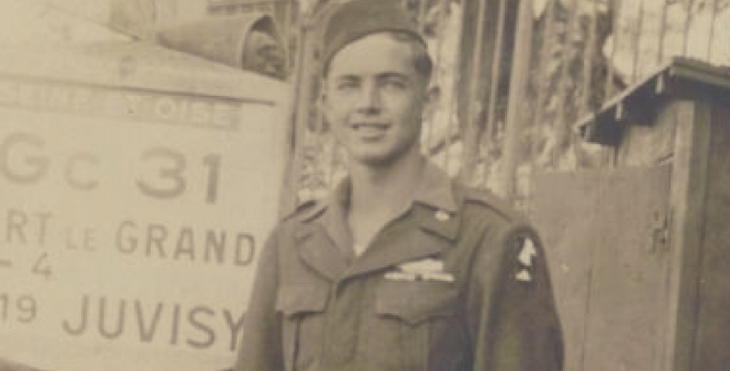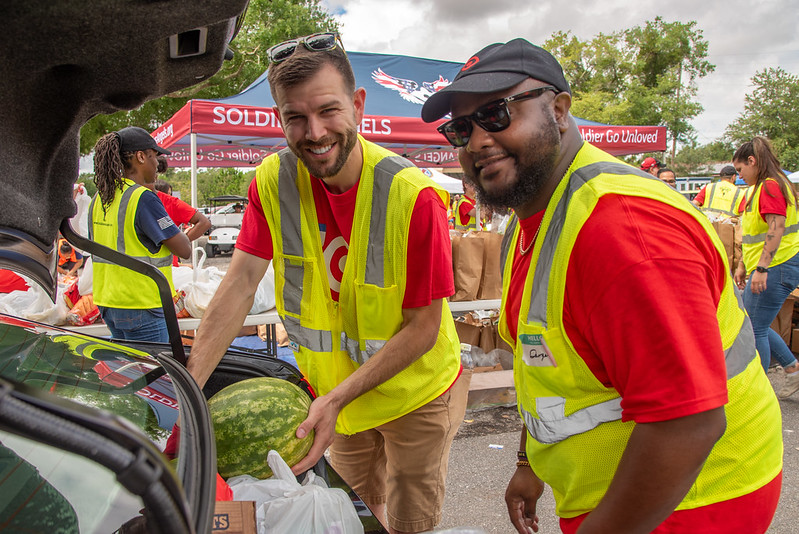William V. Hines is a simple man with an extraordinary story that starts in small Louisiana town and leads to redemption through service. He is a resident at one of the five state-of-the-art Veterans homes that Louisiana Department of Veterans Affairs (LDVA) operates, and he is an inspiration to those who have the honor of meeting him.
Hines was born on Feb. 22, 1926 in the small town of Ruby, Louisiana. Ruby is an unincorporated community in Rapides Parish. His parents, Truley and Evie Greer Hines, were farmers on a 40-acres farm. He and his three siblings, Arley, Odessa and Barbara, had a good childhood.
Like many Americans at the time, Hines was drafted into the United States Army at the age of 18. America was at war, and due to the Selective Training and Service Act that the United States instituted on Sept. 16, 1940, all men between the ages of 18 and 45 were required to register for the draft.
According to the National WWII Museum, by the end of the war in 1945, 50 million men between 18 and 45 had registered for the draft and 10 million had been inducted in the military.
Hines spent 17 weeks at Camp Fannin, located near Tyler, Texas, for training. Camp Fannin was a U.S. Army Infantry Replacement Training Center and prisoner-of-war camp. It only operated for four years before being inactivated in 1946. In late September of 1944, Hines was sent to Ft. Leonard Wood to prepare for the battlefield.
On Dec. 5, 1944, he was sent to Boston and sailed on the USS West Point – SS America.
“We arrived at Marseilles, France on Dec. 15, 1944,” Hines recalls. As history tells us, he arrived at a pivotal moment because the Battle of the Bulge started the very next day, Dec. 16, 1944.
“We boarded the French train referred to as the “40 x 8” because of the 40 soldiers or 8 horses it carried,” said Hines. That train brought them to the Rhine River where they spent the day before being trucked to a town called Wingen-sur-Moder, France.
According to History.net, Wingen-sur-Moder (Wingen on the Moder River) was just a typical French village nestled in the Hardt Mountains. But it was here that GIs of the 70th ‘Trailblazers’ Infantry Division engaged in some of the most intense combat of the Alsatian campaign.
On Jan. 2, 1945, the Germans invaded and took the town. It took seven days to retrieve it. According to Hines, “the weather was the coldest Germany had in 50 years.”
“I would say the hardest thing we faced was the freezing weather, the snow keeping our feet cold all of the time, the poor rations that led to hunger a lot of the time, the sleep deprivation and the immense sense of loss for our fallen,” Hines said.
He goes on to explain that the sleep deprivation was mainly caused by their abnormal shift work. “There were two people to a foxhole,” he explains of his time in battle. “One of us had to stay awake while the other slept in two-hour shifts.”
Hines says his unit also endured a multitude of casualties which took a toll on everyone. “We suffered 99 wounded, 29 killed and 129 that were sent to the sick line duty,” he recalls. Unfortunately, they only had 225 replacements to fill those much-needed vacancies.
He says he felt great sorrow from the loss of his comrades in a battle that lasted 86 days. “The Germans finally surrendered on May 8, 1945, but our elements took more losses than they did.”
Although the battles were tough, Hines says he did experience some memorable moments. “I was first scout and M1918 Browning Automatic rifleman,” he says proudly.
“I led a 600 man battalion for three miles at night through German lines through two mined areas to the Saar River at night with the captain and his camper,” says Hines.
“We arrived at the Town of Furstenhausee, France on the Saar and captured the town without firing a shot,” he recalls.
For his heroic actions, he received a Bronze Star. “After the Germans surrendered, we did ‘occupation’ until we had enough points to come home.” He went home in March of 1946.

William and Pauline enjoyed 68 years of wedded bliss together. “We had three sons and one daughter,” says the doting father. Their names, in order of birth, are: Bill Hines, Sue Hooter, Ronald Hines, and Byron Hines.
Bill is now a retired Owens Minor Medical salesman. Sue became a registered nurse and later worked with her husband. Ronald is also a registered nurse and a nursing home administrator. Byron has degree in Medical Technology and is a retired nursing home administrator. Hines is very proud of his children’s accomplishments.
“I was a bread salesman for Cotton Brothers Bakery for 14 years,” says Hines of his time after the military.
He eventually moved to Bossier City where he managed the first nursing home there and spent 39 years plus as their Administrator.
In 2016, after breaking his hip in a fall, he was admitted to the Northwest Louisiana Veterans Home. This was a bittersweet move for him because his beloved wife had passed away while a patient at the home back in 2012.
“I have made many friends and enjoy playing bingo,” says Hines. “I also spend a lot of time searching through the computer.”
He is a wealth of knowledge when it comes to military history, specifically WWII. “I have done many interviews while living here at the home,” he says. He enjoys talking to the many groups that stop by to visit the facility’s residents. He says some of the regular visitors want to hear WWII stories. “I have done a lot of research about WWII and gladly share it with those who are interested,” says the man who also lived through the war.
Hines is very open about his personal experiences and reasons for wanting to serve his community. Like many Veterans, he struggled while adjusting to his new normal after the war.
“I came home and returned to my job, but it took quite a while to adjust back to normal,” he confides. “Everything from sudden noises, to nightmares, and even those well-meaning unexpected pats on the back,” would bother him in ways they had not beforehand.
“I still re-live many of the things I experienced,” he says. “The loss of two of my good friends, the close calls with snipers, the booby traps, and being knocked flat on my back by artillery shrapnel hitting me on front of my helmet (no damage done),” are some of the things he will never forget.
“I did receive a Bronze Star for the night I led the battalion through enemy lines to the Saar River,” he says nonchalantly. He also earned his Combat Infantry Badge and The Order of the Legion of Honor, which is France’s highest distinction.
The awards and recognition are not what motivated him though. It was a lot more personal than that. “One night in a fox hole, I was feeling very low and helpless,” he recalls. “I asked the Lord if he would let me get back home safely I would serve him,” and serve he did.
“I was called upon to be the administrator of the nursing home our church was building,” he shares. “I accepted the offer without hesitation and worked 39 years as an administrator where I found my place to serve Him.”
For his efforts, Hines says, “I have been blessed with a wife of 68 years, four children, eight grandchildren and 21 great grandchildren.”
You can’t ask for much more than that.

Topics in this story
More Stories
Soldiers' Angels volunteers provide compassion and dedication to service members, Veterans, caregivers and survivors.
Veterans are nearly three times more likely to own a franchise compared to non-Veterans.
The Social Security Administration is hoping to make applying for Supplemental Security Income (SSI) a whole lot easier, announcing it will start offering online, streamlined applications for some applicants.






